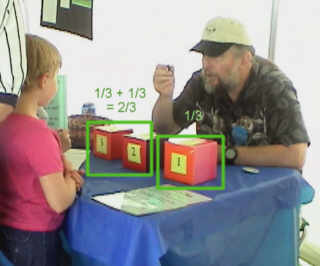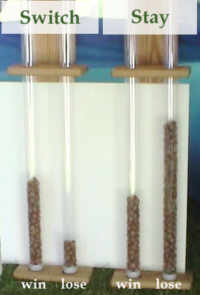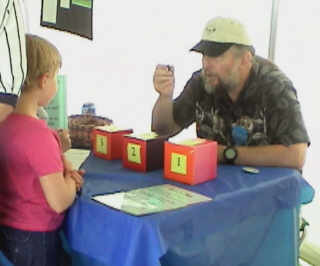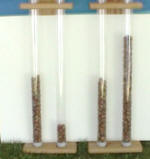|
This puzzle is very simple. But it is very subtle! Many professional mathematicians did not see why "Switch" is the correct answer when the puzzle was shown on the Montly Hall TV program and later discussed in Marilyn vos Savant's feature in Parade, the weekly Sunday supplement magazine. Many wrote letters to the editor expressing with certainty that those who said "Switch" were simply wrong. But some of those mathematicians must have had some doubts, because they set up computer programs to duplicate the experiment that we did at Da VInci Days. Those computer programs gave the same result that we got. (Look at the bottom of this page.) Be aware that statistics is simple but subtle. Also, be assured that statistics is very powerful because Mother Nature has an unnatural love of putting statistical relationships wherever she can. |
"I'm
placing this little ducky into one of these boxes, and you are going to
become a genuine statistic in a genuine scientific experiment. You
are going to guess which box the ducky is in.
"Now, I don't know which box I'm going to put it in until I consult the oracle of randomness here in the basket. It will make sure that as I do this experiment over and over again, the ducky will go into each box pretty much the same number of times, but not in any order, or pattern, or predictable way whatsoever. "OK,
now it's in one of the boxes. Which one are you going to guess it
is in?"
|
At the beginning of the experiment, the odds of the ducky being in any one of the three boxes is 1/3. |
|
By the end of Friday evening,
|
The
statistical guesser makes his guess, and his guess this time is Box #1,

"I'm not yet going to tell you whether you have won or not. But I am going to show you the inside of Box #2, and lo and behold, it does not have the ducky in it. So let's set it aside." |
We can understand the statistics much better if we group the three boxes in a certain way after things have progressed a bit. Put the chosen box in one group (a group of one). Put the other two boxes in the other group (a group of two). The odds of the duck being in the first group is 1/3. The odds of it being in the second group is 2/3. |
|
the middle of the last day  |
"Now,
I'm gonig to give you the opportunity to change your mind. Do you
want to stay with your choice of Box #1, or would you like to switch to
Box #3.
"Stay
or switch, it's up to you."
|
The
experimenter has given you a huge piece of additional information when
he sat that empty box aside. He knew the ducky wasn't in it, and
had, in effect, told you so.
The odds of the ducky being in the second group is still 2/3, and the odds of it being in your original choice is still 1/3. Your odds of winning is 2/3 if you switch and 1/3 if you stay. SWITCH! |



